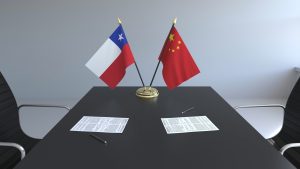In recent weeks, U.S. Chairman of the Joint Chiefs of Staff General CQ Brown and U.S. Southern Command General Laura Richardson visited Chile, attending a multinational exercise and discussing military-to-military cooperation, space and cyber cooperation, and international peacekeeping efforts. While the visit didn’t make global headlines, it did underscore Chile’s role as a key U.S. partner in South America. However, China has quickly increased its influence in Chile, especially in energy, where Chinese companies now control approximately two-thirds of all of Chile’s energy sector.
Such dominance in Chile’s energy sector not only increases Beijing’s economic leverage over Chile; it also potentially threatens Chile’s national security. Both Chilean and U.S. policymakers must act now to ensure Chile successfully balances trade with the world’s second largest economy while also protecting its sovereignty.
For years, Chile’s energy sector was a highly competitive market made up of both foreign and domestic energy companies. But, two calamities severely impacted Chile and the entire world: the 2008 Global Financial Crisis and the COVID-19 pandemic. The 2008 recession was temporary for the United States and Europe, yet many different parts of the world like Chile have felt its effects decades later. In Chile, the recession caused long-term financial instability in foreign and local energy companies, causing many to fall into debt. Then, years later as companies still struggled, COVID-19 forced a heavier toll, causing many to withdraw.
With foreign competitors withdrawing, Chinese state-owned enterprises (SOEs), flushed with financial support from their central government, have acquired several Chilean-based energy companies in the past decade. This was largely due to the role out of Beijing’s signature Belt and Road Initiative launched in 2013. In several instances, the SOEs were either the lowest or only bidders on such projects.
In 2016, for example, State Power Investment Corporation, a Chinese SOE, purchased an international energy company known as Pacific Hydro for $3 billion dollars. Pacific Hydro owns, operates, and manages seven different sites within Chile. Two years later, China Southern Power Grid (CSPG) bought a 27.79 percent share, worth about $1.3 billion, in Transelec, making CSPG the largest shareholder in one of the biggest Chilean energy companies. Transelec has an estimated 10,135 kilometers of transmission lines, covering 98 percent of Chile’s population. That same year, China’s State Grid International Development (CSGID) purchased all of Sempra Energy’s assets within Chile for the price of $2.23 billion. All the assets were subsidiary companies, which include 100 percent of Chilquinta Energia, Tecnored, and Eletrans. In 2020, CSGID purchased the 97.3 percent ownership share of CGE from Spain-based Naturgy for $3 billion.
In many cases, for these foreign companies, it was easier to sell assets and even out their debt than to keep trying to invest in them. For example, at a press conference after the transaction between Sempra Energy and CSGID was completed in 2018, Sempra Energy’s CEO, Jeoffrey Martin, stated, “Proceeds from this transaction will be used to strengthen our balance sheet and meet the growing capital needs of our core utilities in California and Texas.” Again in 2020, the Spain-based Naturgy came out to clarify that they were selling their Chilean assets to focus on “countries with stable regulations and macroeconomic conditions.”
Investing in the energy sector is another way for China to create economic entanglement through infrastructure projects to support the expansion of other projects on Beijing’s agenda. Chile is an attractive location for Beijing for three primary reasons: it is one of the big three (along with Argentina and Bolivia) in the Lithium Triangle, Chile has massive copper mines which China utilizes, and Chile is a Pacific country, facilitating trade of these crucial resources to China. In trade, China imports 74.1 percent of all Chilean copper exports and 72 percent of its lithium exports. Coupled with investments in key mining and infrastructure projects, all of this increases China’s economic leverage over Chile.
Some countries elsewhere in the world have suffered from Beijing’s economic coercion. In 2010, China briefly banned exports of rare earth elements to Japan because of their dispute over islets in the East China Sea. In 2020, China placed tariffs on a wide range of Australian products, from wine and barley to coal and timber, as retaliation for Australia’s call for the international community to conduct an independent investigation of COVID-19’s origins. And China restricted trade with Lithuania after the Baltic country announced it would deepen engagement with Taiwan. Given such past behavior, Chilean policymakers must ask themselves: How would China react if there were a diplomatic disagreement with Chile?
Understandably, Chile’s leaders must balance strengthening economic ties with China while protecting their country’s sovereignty. But there are steps that can be taken to reduce the risk.
First, Chile should establish an interagency investment screening mechanism like the Committee on Foreign Investment in the United States. This will ensure that the Chilean Ministry of Defense will have the chance to evaluate subsequent investments – from China or other countries – through a national security lens.
Second, Chile should work to diversify the number of companies in its energy sector to prevent a monopoly by China’s SOEs. That includes boosting trade missions to the U.S., Spain, and elsewhere to court more foreign direct investment, and leveraging existing initiatives like the U.S. Development Finance Corporation, the Inter-American Development Bank, and the EUs Global Gateway.
Third, Chile could work with partners like the U.S. to set up sufficient safeguards to protect the physical and digital infrastructure associated with these energy projects from undue foreign manipulation.
Fourth, when conducting due diligence on a Chinese SOE bidder, Chilean policymakers should leverage existing databases like Florida International University’s Chinese activities dashboard to understand which SOEs have a history of corruption, labor violation, environmental damage, or undue delays.
Most importantly, the Chilean people must vote for leaders who will stand up to foreign influence and protect their interests for a secure energy future.

































